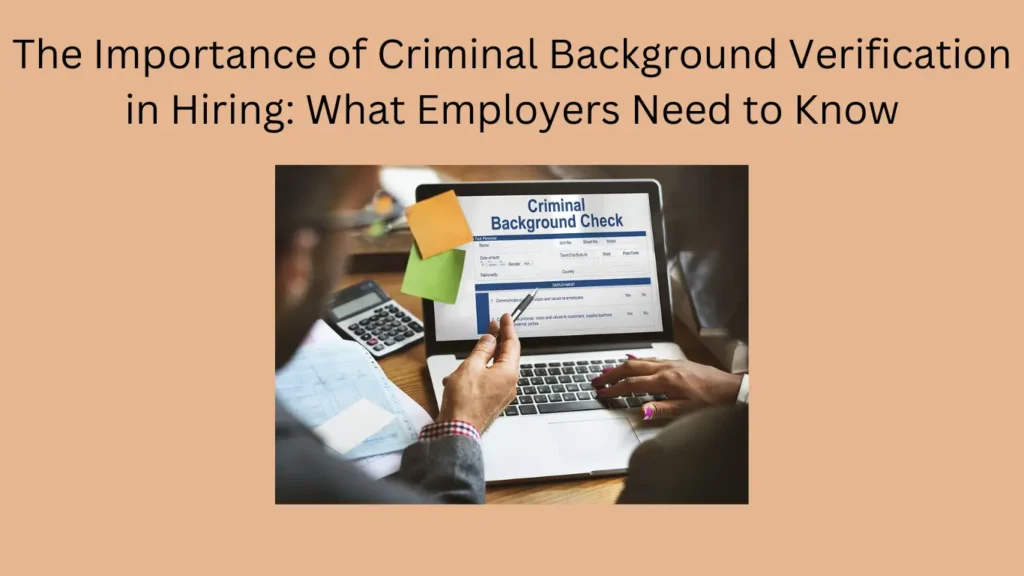In today’s competitive job market, hiring the right candidate is crucial for the success and safety of any organization. Criminal background verification has become an essential part of the hiring process, ensuring that employers make informed decisions while maintaining a safe and productive work environment. This guide will walk you through the importance of criminal background verification, the key steps involved, and best practices to follow.
Why Criminal Background Verification is Important
- Safety and Security: Ensuring the safety of employees, clients, and stakeholders is a top priority for any organization. Conducting criminal background checks helps identify individuals with a history of violent or dishonest behavior, reducing the risk of workplace incidents.
- Legal Compliance: Many industries have regulations that mandate criminal background checks for certain positions. Failing to comply with these regulations can result in legal penalties and damage to the company’s reputation.
- Protecting Company Reputation: Hiring someone with a criminal record for serious offenses can harm the company’s image and erode trust among clients and partners. A thorough background check helps protect the company’s reputation.
- Reducing Turnover: Hiring the wrong candidate can be costly in terms of time, money, and resources. Criminal background verification helps ensure that the candidates hired are less likely to engage in misconduct, thus reducing turnover and related costs.
Key Steps in Criminal Background Verification
- Define the Scope: Determine which positions require background checks and what specific information is needed. This may include criminal history, credit reports, and other relevant data.
- Obtain Consent: Before conducting any background check, obtain written consent from the candidate. Inform them about the process and how the information will be used.
- Choose a Reputable Screening Service: Partner with a reliable background screening provider that complies with legal standards and provides accurate, up-to-date information.
- Review and Verify Information: Carefully review the background check results. Verify any discrepancies with the candidate and give them an opportunity to explain any negative findings.
- Make Informed Decisions: Use the information gathered to make informed hiring decisions. Consider the nature of any offenses, how long ago they occurred, and their relevance to the job role.
Best Practices for Employers
- Consistency: Apply the same background check process to all candidates for similar positions to ensure fairness and avoid discrimination claims.
- Compliance with Laws: Stay updated on federal, state, and local laws regarding background checks. The Fair Credit Reporting Act (FCRA) and Equal Employment Opportunity Commission (EEOC) guidelines provide critical frameworks for conducting lawful background checks.
- Confidentiality: Handle all background check information confidentially and securely. Only authorized personnel should have access to this sensitive information.
- Clear Policies: Develop clear, written policies regarding background checks and communicate them to all candidates. This transparency helps build trust and sets expectations.
- Follow Adverse Action Procedures: If you decide not to hire a candidate based on the results of a background check, follow the appropriate adverse action procedures, including providing the candidate with a copy of the report and an opportunity to respond.
Conclusion
Criminal background verification is a vital part of the hiring process, offering numerous benefits such as enhanced safety, legal compliance, and protection of company reputation. By following best practices and adhering to legal guidelines, employers can make informed hiring decisions that contribute to a safe and productive work environment. Remember, a thorough background check not only protects your organization but also demonstrates a commitment to integrity and due diligence.
For further Inquires Contact Us
FAQs
Why are criminal background checks important in hiring?
Criminal background checks are crucial for ensuring workplace safety, legal compliance, protecting the company’s reputation, and reducing turnover by hiring trustworthy employees.
What information is typically included in a criminal background check?
A criminal background check may include an individual’s criminal history, credit reports, and other relevant data such as past convictions, arrests, and court records.
How do I legally conduct a criminal background check on a candidate?
First, obtain written consent from the candidate. Partner with a reputable screening service and ensure you comply with federal, state, and local laws, such as the FCRA and EEOC guidelines.
What should I do if a candidate’s background check reveals a criminal record?
Review the findings carefully, verify any discrepancies, and give the candidate a chance to explain. Consider the nature of the offense, its relevance to the job, and how long ago it occurred before making a decision.
How can I ensure fairness and avoid discrimination in background checks?
Apply the same process consistently for all candidates in similar positions, follow legal guidelines, and maintain transparency by having clear, written policies regarding background checks.
